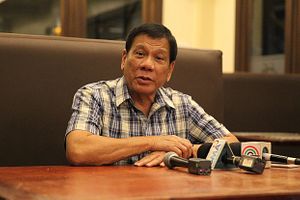Proposed constitutional amendments in Cambodia and the Philippines could worsen impunity and legitimize authoritarianism in both countries.
Criticized for persecuting the opposition and political dissenters, Cambodian Prime Minister Hun Sen and Philippine President Rodrigo Duterte are now accused of imposing dictatorship through constitutional reforms.
In Cambodia, the National Assembly has approved amendments to the constitution, which alarmed many because they undermine freedom of expression. Several amendments to existing constitutional provisions would criminalize any activity that “affects the national interest” of Cambodia and its citizens. Political parties and the civil society are also required to uphold the national interest at all times.
While it is not wrong to demand loyalty from citizens, it is deeply worrying if patriotism is equated with support for the ruling party.
It is clear that the amendments are intended to stifle free speech and deter people from mobilizing against government policies.
In response to the approval of the constitutional amendments, various civil society groups signed a petition expressing alarm over the “cynical attempt to deny the Cambodian people the fundamental freedoms to which they are entitled.”
“These amendments would provide yet more legal weaponry to a government that appears determined to eliminate all forms of peaceful dissent, pluralism, and open political debate,” the petition said.
Aside from pushing for constitutional amendments, the government also introduced an anti-royal insult law (lese majeste) – along the lines of one that Thailand has – which reflects the state’s disturbing intolerance of contrary views.
These legislative reforms could exacerbate human rights abuses by allowing state forces to criminalize the peaceful activities of individuals and groups working for democratic reforms, justice, and accountability.
This fear is not without basis since the three-decade-old Hun Sen government is notorious for detaining land rights activists and opposition politicians. In 2017, it ordered the closure of dozens of radio stations broadcasting programs that criticized the government.
The crackdown on dissenting voices could be part of the ruling party’s consolidation of power in time for the upcoming general elections.
Meanwhile, Duterte’s allies are fast-tracking the proposal to overhaul the 1987 Philippine Constitution in order to adopt a federal and parliamentary type of government. They claim that this change in the system is needed to spur economic progress in the provinces.
But they are silent about the inclusion of several provisions that would grant the president legislative powers during the transition period, the adjustment of term limits for elected officials, and the possibility of canceling the 2019 midterm elections. In other words, charter change would allow Duterte and his party to extend their term of office and expand their powers, similar to what former dictator Ferdinand Marcos did in 1973.
Duterte’s allies also wanted to amend the constitutional provision related to media by inserting the phrase “responsible exercise of freedom of expression.” Human rights groups quickly denounced this as an insidious attempt to silence the Philippine press.
Curiously, pro-Duterte proponents of charter change wanted to insert in the new constitution that the Philippines is aspiring to be a “drug-free” country. Would this mean the institutionalization of Duterte’s controversial and widely discredited anti-drug program (known in the local language as Tokhang)? That is unclear but remains a worrying prospect.
Another major amendment is the removal of the constitutional provision banning foreign bases in the Philippines. This is significant since the United States is currently building “facilities” in several parts of the country through a military agreement while China is accused of expanding its presence in the Philippines’ maritime territories.
Hun Sen got what he wanted when the National Assembly passed the proposed constitutional amendments last month. Meanwhile, Duterte’s party is still lobbying for the support of the Senate and the general public. Duterte’s allies insist that they have the numbers in both Houses of Congress and the support of the public to pass the charter change bill, but opposition to the creeping authoritarianism continues to grow.
Instead of empowering the people, the proposed constitutional amendments of the Hun Sen and Duterte governments could weaken the already sagging democracies of Cambodia and the Philippines.
Unfortunately, tinkering with the constitution seems to be the preference of many Southeast Asian generals and power-hungry leaders who wanted to legitimize their authoritarian governments.
This was done in Myanmar when Burmese generals passed a constitution that reserved seats for the military in the cabinet, parliament, and other agencies of the bureaucracy. Thailand’s junta also passed a constitution that guaranteed military influence in the bureaucracy even if civilian rule is restored in the future.
So what Hun Sen and Duterte are doing is not exactly new. But nor does it excuse them for their undemocratic actions and for attempting to undermine the civil liberties in their countries. This actually makes it more important to closely monitor the efforts of civil society and other forces that are opposing the rise of authoritarianism whether it is in Cambodia, the Philippines, or the rest of Southeast Asia.

































